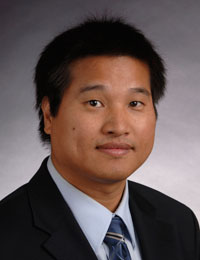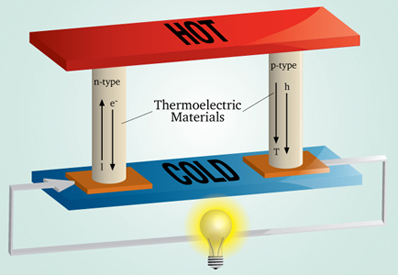Dr. Shiren Edward Wang Receives Prestigious NSF CAREER Award for Organic Thermoelectric Composites
Edited by Javad Hashemi and Jeff Sammons

Dr. Shiren Edward Wang, an assistant professor of industrial engineering at Texas Tech, has been selected to receive a 2010 NSF CAREER Award from the National Science Foundation. Wang's award recognizes his career development plan entitled, "Exploring Novel Organic Thermoelectric Composites with Hierarchical Architecture and High Figure of Merit." His research focuses on nanostructured organic thermoelectric composites.
All around us, there are many sources of thermal energy, both natural and manmade. When the sun shines on the body of a car, the exterior of the car heats up and eventually increases the temperature of the interior of the car. Computer processors — as an inherent part of how they function — produce thermal energy. These are undesirable sources of heat generation and energy loss. Computer and auto manufacturers alike continually search for ways of decreasing the amount of generated heat, and thus the operating temperatures of their products.
One method of recovering heat from a material or device is through thermoelectric conversion. Thermoelectric conversion involves the conversion of thermal energy to electrical energy or electrical energy to thermal energy (as needed). This process can be used for power generation through the harvesting of heat sources, such as computer processors and engines. The heat that is generated from the sun's rays on the roof of an electric vehicle can be used to charge that same car's battery. In computers, the heat from the processor could be recycled to recharge the battery as the computer is in operation.
Thermoelectric conversion is renewable, reliable, and scalable. The efficiency of thermoelectric conversion is significantly determined by the material's thermal and electrical conductivity, along with other factors.
Wang is working to synthesize and characterize new organic materials that could revolutionize the thermoelectric conversion industry. Organic materials hold promise for these applications because they are lightweight, abundant, easy to process, and environmentally-benign.

Existing organic thermoelectric composites are not highly efficient and significantly hinder potential applications. Wang is studying the structure and thermoelectric behavior of these composites through theoretical and experimental investigations. He is working to understand how heat and electricity is transferred through these materials. By understanding this, he can design new nanostructures and materials that will maximize efficiency and performance. Using chemical and physical processing methods, he is synthesizing new organic composites through the use of carbon nanocrystals.
His research could lead to new materials that can be produced on a large scale. These materials could be used in a variety of applications, at a relatively low cost to consumers. The successful completion of this work could potentially lay the groundwork for a new area within the growing renewable energy industry.
Wang joined the Department of Industrial Engineering in the Whitacre College of Engineering as an assistant professor in 2007. He received a Bachelor of Science and a Master of Science from Beijing University of Aeronautics and Astronautics in 1995 and 1998, respectively; a Master of Science through the Singapore-Massachusetts Institute of Technology Alliance in 2002, and a Doctor of Philosophy from Florida State University in 2006.
Wang has authored more than 35 journal and conference publications and was the recipient of a 3M Young Faculty Award in 2009.
Edward E. Whitacre Jr. College of Engineering
-
Address
100 Engineering Center Box 43103 Lubbock, Texas 79409-3103 -
Phone
806.742.3451 -
Email
webmaster.coe@ttu.edu
